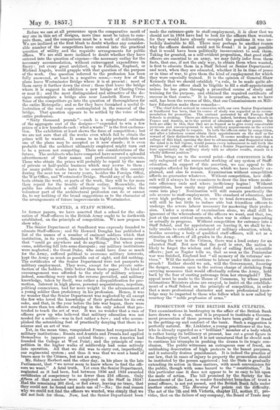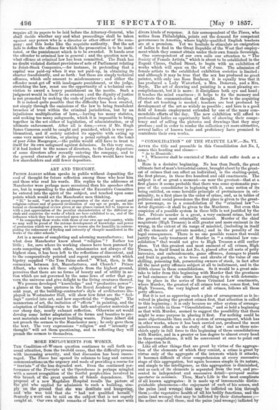WANTED, A STAFF SCHOOL.
IN former papers, we have asserted that a school for the education of Staff-officers in the British Army ought to be forthwith established, on the principle of competition. We now propose to show why.
The Senior Department at Sandhurst was expressly founded to educate Staff-officers ; and Sir Howard Douglas has published a list of the names of a number of eminent soldiers which that institution, in its youth, furnished to Wellington's famous army that "could go anywhere and do anything. But when peace came, soldiering fell into some disrepute; our military institutions were neglected; the Great Duke, who could have done so much for the Army, suffered political to overcome military interests, kept the Army as much as possible out of sight, anA did nothing. The certificates of the Senior Department were not passports to military employment. They were, except for the private satisfaction of the holders, little better than waste paper. No kind of encouragement was afforded to the study of military science ; indeed, something very much the reverse prevailed, and military knowledge, taken by itself, was rather a disqualification for promotion. Interest in high places, personal acquaintance, nepotism, politictil connexions; had far more weight in the advancement of a piing soldier than proficiency in his profession. Hence, it was no wonder that the Senior Department was neglected by all except the fewwho loved the knowledge of their profession for its own sake, and that, in the year before the late war began, there were not more than ten officers studying in the only school that pretended to teach the art of war. It was no wonder that a race of officers grew up who believed that military education was not needed for a soldier—was in fact rather a bore ; and who accomplished the astonishing feat of practically denying that there is a science and an art of wax.
Yet, in the mean time, vanquished France had reorganized her military institutions ; Russia and Austria and Prussia had applied themselves to improve and, extend theirs ; even America had founded the College at West Point; and the principle of competition in the higher walks of soldiership had come actively into operation. All that we did was to carry out, imperfectly, our regimental system ; and thus it was that we sent a band of brave men to the Crimea, but not an army. Mr. Sidney Herbert said the other day, in his place in the late Parliament, that "we never seem to know where to find the officers we want." A fatal truth. Yet even the Senior Department, neglected as it had been, had between 1836 and 1854 awarded certificates of competency to no fewer than 216 officers. Only
fifteen of that number were employed on the Staff in 18541 Had the remaining 201 died, or fled away, leaving no trace, that they could not be found and made use of ?—No ; the real reason why we could not find the officers we wanted, was simply that we did not look for them. Now, had the Senior Department been made the entrance-gate to staff-employment, it is clear that we should not in 1854 have had to look for the officers then wanted, for they would have already occupied the positions it was unluckily desirable to fill. There may perhaps be another reason why the officers desired could not be found : it is just possible that it would have been politically inconvenient to seek them. Taking for granted, as a self-evident proposition, that good staffofficers are essential to an army, we may fairly infer from these facts, that one, if not the only way, to obtain them when wanted, is first to educate them in a Staff School or Senior Department; and next, when they are educated, whether it be in time of peace or in time of war, to give them the kind of employment for whieli they were especially trained. It is the opinion of General Shaw Kennedy that we should establish "a rule' to be made quite absolute, that no officer shall be 'eligible to fill a staff-appointment 'unless he has gone through a prescribed course of study and training. for the purpose, and obtained the required certificate of success in that course." It is because our practice, as we have said, has been the reverse of this, that our Commissioners on Military, Education make these remarks— "The chief defect noticed in connexion with our own Senior Department at Sandhurst has been, that its course of study was regarded as no reemnmendation for promotion. The contrast presented by all Foreign Staff Schools is striking. There are differences, indeed, between these schools in Franco and Austria, as to the period of admission and other points. But both are alike in Om, that they are so framed as to give every conceivable premium and encouragement to such military acquirements as the service of the staff is thought to require. In both the officers enter by competition, and after a laborious course obtain their appointments on the staff as the reward of their distinctions in the school. It seems needless to urge that a college of this kind, opening the door to advancement, and frequented when the mind is in full vigour, would possess every inducement to call forth the energies of young officers of talent. But a Senior Department offering a bare opportunity for military study with no ulterior results, stands in a wholly different position."
This brings us to the second point—that cotirmrriorr is the only safeguard of the successful working of any system of Staffeducation. In support of this assertion, we can appeal to the examples afforded by foreign nations, which we have already explained, and also to reason. Examination without competition affords no guarantee whatever. Without competition, how difficult will it always be for examiners to draw the line where moderate efficiency ends and where inefficiency begins ! Without competition, how easily may political and personal influences come into play! Nomination will still remain practically the sole avenue to staff-employment. The standard of education, not even high perhaps at first, is sure to tend downwards. There will still be but little to induce able but friendless officers to undergo the severe labour necessary for mastering their profession. Under a system of examination alone, we shall still be ignorant of the whereabouts of the officers we want, and that, too, just at the most critical moments, when war is either impending or actually in progress. Without competition for entrance into a Staff School, and for appointment on leaving it, we shall be totally unable to establish a standard of military education, which, besides securing a body of qualified staff-officers, will act as a stimulus on officers of all grades in the Army.
During the war in the Crimea, there was a loud outory for an educated Staff. But now that the peril is over, the nation is likely to forget the wisdom and duty of calling forth scientific officers ; just as Napier tells us, that as soon as the Peninsular war was finished, England lost "all memory of its veterans' services." Will the nation continue to labour under this serious reproach? Rather should we ask, will the Government, knowing the danger, remain open to the serious charge of shrinking from carrying measures that would effectually reform the Army, held back by the fear of ousting patronage from her stronghold? The appeal must be made to the House of Commons, by whose potent intimations Ministers alone are swayed, to insist on the establishment of a Staff School on the principle of competition, in order that a more professional character and more professional knowledge may be imparted to those who follow what is now called by courtesy the "noble itlrofeesion of arms."
PROSECUTION OF THE BRITISH BANK CULPRITS. Din examinations in bankruptcy in the affair of the British Bank have drawn to a close, and it is proposed to institute a Government prosecution of those persons who have been guilty of fraud in the getting-up and conduct of the bank. Such a suggestion is perfectly natural. Mr. Linklater, a young practitioner at the bar, who is already regarded as a " brilliant " member of a body which is rather losing its brilliancy at present, has cut a great figure in the Bankruptcy Court, and it is not unnatural that he should seek to continue his triumphs in pushing the drama to its tragic conclusion. The public witnesses an outrageous ease of fraud, an unblushing desecration of high pretexts to the basest purposes, and it naturally desires punishment. It is indeed the practice of our law, that in cases of injury to property the prosecution should be instituted by the person aggrieved ; but the State is gradually extending its action in these matters, with much convenience for the public though with some hazard to the "constitution." In this particular case it does not appear to be so easy to hit upon the mode of action. The bill promised. by the Society, for the Amendment of the Law, to render fraudulent breaches of trust a penal offence, is not yet passed, and the British Bank falls under another statute. The Morning Poet points out the difficulty. The act of the 7th and 8th Victoria, chapter III, section 27, provides, that on the failure of any company, the Board of Trade may require all its papers to be laid before the Attorney-General, who shall decide whether any and what proceedings shall be taken against any person who is a director or other officer of the company: and this looks like the requisite authority. But the act fails to define the offence for which the prosecution is to be instituted, or the punishment which is to be awarded. It hands over the offender to criminal law in general ; and the question now is, what offence at criminal law has been committed. The Bank has no doubt violated distinct provisions of acts of Parliament relating to Joint-Stock Companies,—for instance, in pretending that a capital was paid-up when it was not paid-up, in obtaining its charter fraudulently, and so forth : but these are simply technical offences, which only amount to misdemeanour; and either the offender must get off with inadeqnate punishment, or the judge, stretching the law, must use the opportunity of a technical conviction to award a heavy punishment on the merits. Such a judgment would in itself be an evasion ; and the dignity of justice is not promoted by seeking the ends of justice through a dodge. It is indeed quite possible that the difficulty has been created, not simply through the omissions of the law to bring fraudulent breaches of trust within the criminal jurisdiction, but by an injudicious multiplication of laws,—having too many statutes, and seeking too many safeguards, which it is impossible to bring together in the act either of legislation of administration, or of ultimate enforcement. After all is done,—even if Mr. Hugh Innes Cameron could be caught and punished, which is very problematical, and if society satisfied its appetite with eating up some very minor victim, or placing a penal epitaph on the tomb of poor John Maogregora--:the public would still have to trust to itself for its own safeguard against delusions. In this very case, if it had looked to the names of directors, to the hasty departure of some directors after recently entering the company, and to the general character of its proceedings, there would have been few shareholders and still fewer depositors.



























 Previous page
Previous page